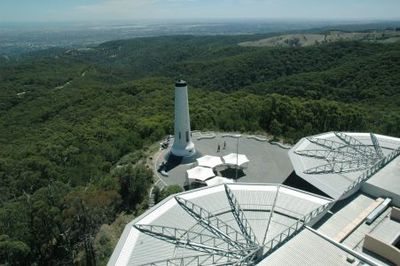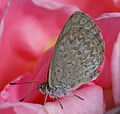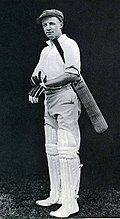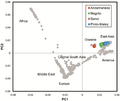Portal:Australia
| Showcase | Content | Interesting facts | Contributing |
Introduction
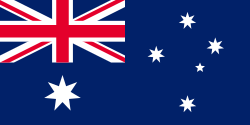
Australia, officially the Commonwealth of Australia, is a country comprising the mainland of the Australian continent, the island of Tasmania and numerous smaller islands. It has a total area of 7,688,287 km2 (2,968,464 sq mi), making it the sixth-largest country in the world and the largest in Oceania. Australia is the world's flattest and driest inhabited continent. It is a megadiverse country, and its size gives it a wide variety of landscapes and climates including deserts in the interior and tropical rainforests along the coast.
The ancestors of Aboriginal Australians began arriving from south-east Asia 50,000 to 65,000 years ago, during the last glacial period. By the time of British settlement, Aboriginal Australians spoke 250 distinct languages and had one of the oldest living cultures in the world. Australia's written history commenced with Dutch exploration of most of the coastline in the 17th century. British colonisation began in 1788 with the establishment of the penal colony of New South Wales. By the mid-19th century, most of the continent had been explored by European settlers and five additional self-governing British colonies were established, each gaining responsible government by 1890. The colonies federated in 1901, forming the Commonwealth of Australia. This continued a process of increasing autonomy from the United Kingdom, highlighted by the Statute of Westminster Adoption Act 1942, and culminating in the Australia Acts of 1986.
Australia is a federal parliamentary democracy and constitutional monarchy comprising six states and ten territories. Its population of almost 28 million is highly urbanised and heavily concentrated on the eastern seaboard. Canberra is the nation's capital, while its most populous cities are Sydney and Melbourne, both with a population of more than 5 million. Australia's culture is diverse, and the country has one of the highest foreign-born populations in the world. It has a highly developed economy and one of the highest per capita incomes globally. Its abundant natural resources and well-developed international trade relations are crucial to the country's economy. It ranks highly for quality of life, health, education, economic freedom, civil liberties and political rights.
Featured article -
Muckaty Station, also known as Warlmanpa, is a 2,380-square-kilometre (920 sq mi) Aboriginal freehold landholding in Australia's Northern Territory, 110 kilometres (68 mi) north of Tennant Creek, and approximately 800 kilometres (500 mi) south of Darwin. Originally under traditional Indigenous Australian ownership, the area became a pastoral lease in the late 19th century and for many years operated as a cattle station. It is traversed by the Stuart Highway, built in the 1940s along the route of the service track for the Australian Overland Telegraph Line. It is also crossed by the Amadeus Gas Pipeline built in the mid-1980s, and the Adelaide–Darwin railway, completed in early 2004. Muckaty Station was returned to its Indigenous custodians in 1999. (Full article...)
Selected biography -
Howard Walter Florey, Baron Florey, OM FRS FRCP (/ˈflɔːri/; 24 September 1898 – 21 February 1968) was an Australian pharmacologist and pathologist who shared the Nobel Prize in Physiology or Medicine in 1945 with Ernst Chain and Sir Alexander Fleming for his role in the development of penicillin. (Full article...)
Did you know (auto-generated) -
- ... that the Bluey special "The Sign" reminded a Sydney Morning Herald reporter of Australia's housing crisis?
- ... that people traveled from as far away as Australia and the Netherlands to stay at a house in Ohio?
- ... that "The Potato King of Colorado" survived a shipwreck, mined for gold in Australia, and helped establish an alcohol-free Methodist colony?
- ... that Edward Thonen, one of the miners killed in the Eureka Rebellion, had gained notoriety in England as a jewellery thief prior to his emigration to Australia?
- ... that convict James Davis escaped custody in Australia and lived with Aboriginal Australians for 13 years?
- ... that Australian train driver Bill Morrow received the Soviet Union's Lenin Peace Prize alongside Fidel Castro?
- ... that Mark Hutton was the first Australian to be a starting pitcher in a Major League Baseball game?
- ... that Australian politicians may face the pub test?
In the news
- 3 May 2025 – 2025 Australian federal election
- The Australian Labor Party under current Prime Minister Anthony Albanese increases its majority in the House of Representatives, winning a second term. (ABC News Australia).
- 20 April 2025 –
- The death toll from drownings during the week across Australia increases to seven after a fisherman dies after being swept off rocks near Sydney. Three people remain missing and one other was injured. (Philippine Daily Inquirer)
- 7 April 2025 – Tariffs in the second Trump administration, Executive orders in the second presidency of Donald Trump
- The Nikkei 225, SSE Composite Index, and Hang Seng Index experience substantial losses following Friday’s losses on the New York Stock Exchange as a result of U.S. president Donald Trump's tariffs. European markets also decline, particularly in banking and defense sectors. The ASX 200 in Australia and the Kospi in South Korea also closes lower. (BBC News)
- 2 April 2025 – Tariffs in the second Trump administration
- In the 10% tariff, the U.S. lists the Australian territory of Heard Island and McDonald Islands near Antarctica, despite the fact that it has no human inhabitants, imports or exports. In response to finding these islands in the list, Australian prime minister Anthony Albanese commented that "Nowhere on earth is safe" for the tariff. (The Guardian)
- 31 March 2025 – Australia–North Korea relations
- The Royal Australian Air Force deploys a long-range maritime patrol aircraft P-8 Poseidon to Kadena Air Base in Okinawa Prefecture, Japan, to monitor North Korean maritime activities in the Yellow Sea, including weapons shipments prohibited under international sanctions. (NK News)
- 8 March 2025 – 2024–25 Australian region cyclone season
- Cyclone Alfred
Selected pictures -
On this day
- 1865 – Bushranger Ben Hall is ambushed and shot dead by police near Goobang Creek, New South Wales.
- 1882 – Geologist and explorer Sir Douglas Mawson is born in Shipley, England.
- 1906 – The first electric trams begin operations in Melbourne, with the opening of a service from St Kilda to Brighton.
- 1947 – Sixteen people are killed and 38 injured when a crowded picnic train derails (wreckage pictured) near Camp Mountain, Queensland.
- 1998 – Four Royal Australian Navy sailors die from carbon monoxide poisoning after a fire aboard HMAS Westralia.
General images
Topics
More portals
WikiProject
 |
 |

| |
Consider joining WikiProject Australia, a WikiProject dedicated to improving Wikipedia's coverage of topics related to Australia. The project page and its subpages contain suggestions on formatting and style of articles, which can be discussed at the project's notice board. To participate, simply add your name to the project members page.
As of 5 May 2025, there are 208,237 articles within the scope of WikiProject Australia, of which 598 are featured and 895 are good articles. This makes up 2.98% of the articles on Wikipedia, 5.26% of all featured articles and lists, and 2.15% of all good articles (see WP:AUSFG). Including non-article pages, such as talk pages, redirects, categories, etc., there are 416,474 pages in the project.
Associated Wikimedia
The following Wikimedia Foundation sister projects provide more on this subject:
-
Commons
Free media repository -
Wikibooks
Free textbooks and manuals -
Wikidata
Free knowledge base -
Wikinews
Free-content news -
Wikiquote
Collection of quotations -
Wikisource
Free-content library -
Wikiversity
Free learning tools -
Wikivoyage
Free travel guide -
Wiktionary
Dictionary and thesaurus


















